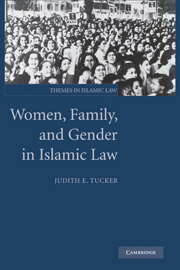Book contents
- Frontmatter
- Contents
- Acknowledgements
- Maps
- 1 Introduction
- 2 Woman as wife and man as husband: making the marital bargain
- 3 Woman and man as divorced: asserting rights
- 4 Woman and man as legal subjects: managing and testifying
- 5 Woman and man in gendered space: submitting
- 6 Conclusion
- Glossary
- Bibliography
- Suggestions for further reading
- Index
3 - Woman and man as divorced: asserting rights
Published online by Cambridge University Press: 05 June 2012
- Frontmatter
- Contents
- Acknowledgements
- Maps
- 1 Introduction
- 2 Woman as wife and man as husband: making the marital bargain
- 3 Woman and man as divorced: asserting rights
- 4 Woman and man as legal subjects: managing and testifying
- 5 Woman and man in gendered space: submitting
- 6 Conclusion
- Glossary
- Bibliography
- Suggestions for further reading
- Index
Summary
Marriage, while an institution of critical and central importance in the Islamic legal landscape of social relations, was not required or necessarily expected to be a permanent one. Rather, Islamic legal discourses and practices recognized that, upon occasion, marital relations might be better terminated; there is no moral dictum of “till death do us part” and no legal insistence on the indissolubility of the marital tie as in much of the Christian tradition. A number of verses in the Qurʾan address the question of divorce in a tone that suggests that ending a marriage, while not to be taken lightly, may be preferable to continuing in a relationship that does not fulfill its purposes. Men are enjoined, insofar as their wives are concerned, to “retain them honorably or set them free honorably” (2:231), but cautioned against taking overly hasty decisions to divorce their wives: “if you are averse to them, it is possible you may be averse to a thing and God set in it much good” (4:19). Clearly marriages can fail and relationships can sour, and a man may ultimately decide, as verse 4:19 continues, to “exchange a wife in place of another.” Before such a serious decision is reached, however, the Qurʾan counsels reconciliation if possible:
And if you fear a breach between the two,
Bring forth an arbiter from his people
and from her people an arbiter, if they
desire to set things right; God will
compose their differences …
(4:35)- Type
- Chapter
- Information
- Women, Family, and Gender in Islamic Law , pp. 84 - 132Publisher: Cambridge University PressPrint publication year: 2008

